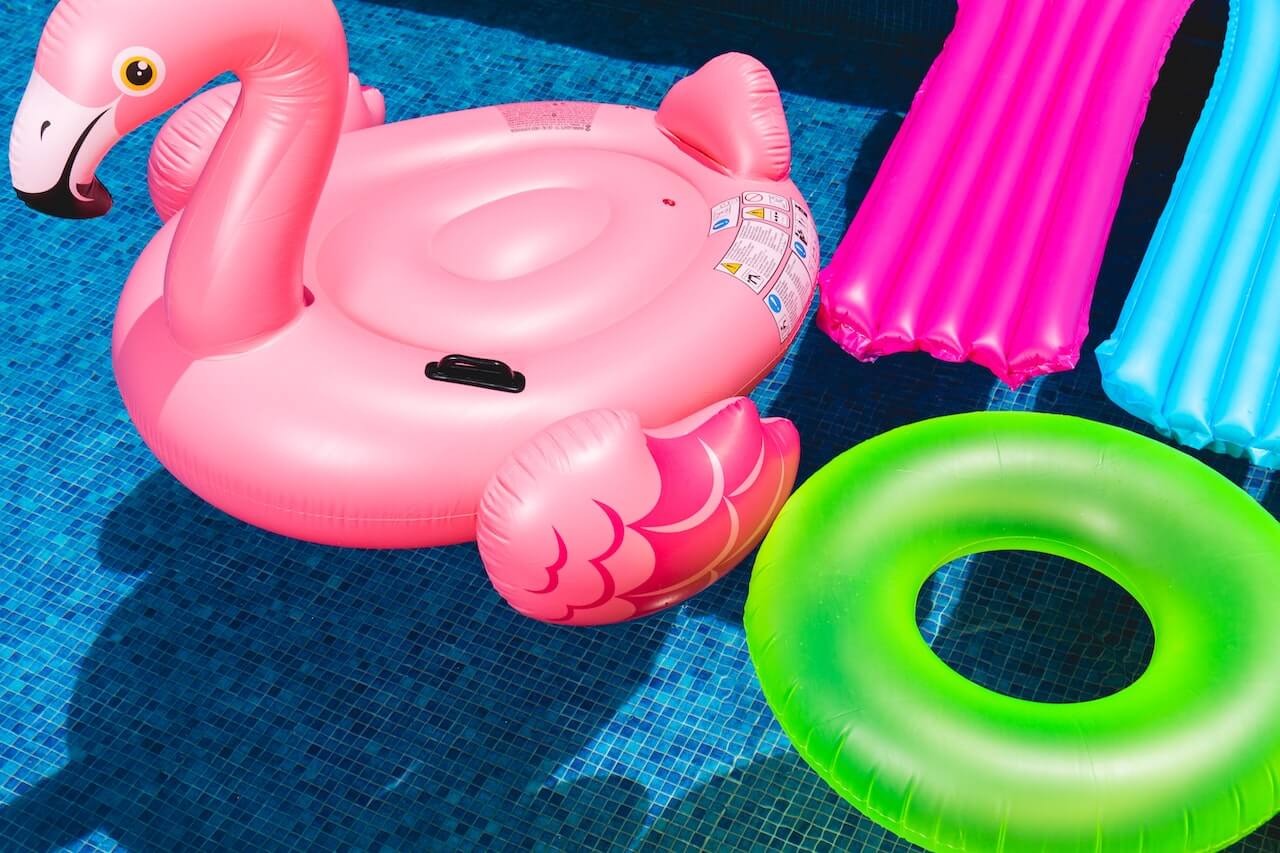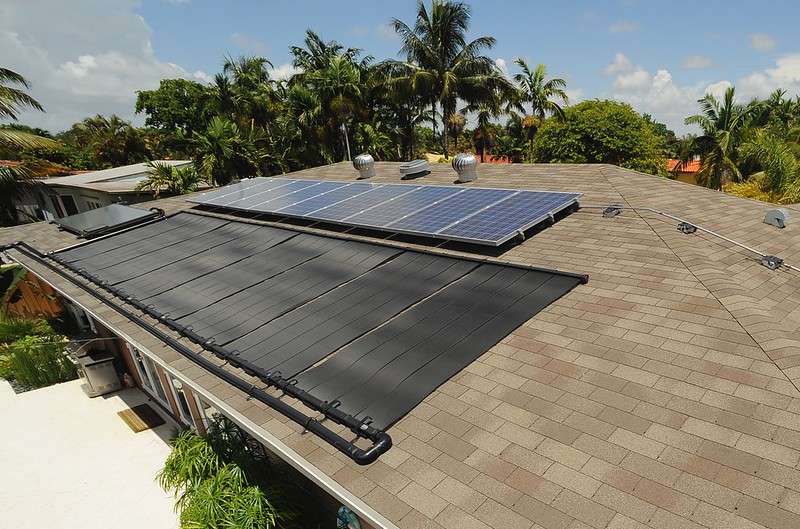Your backyard swimming pool is perhaps the most enjoyable place to spend your time during the summer. However, to ensure the water is clean, clear, and comfortable to swim in, you have to add a lot of chemicals and use a lot of energy to keep things running smoothly.
Seeing as how you found this article, I’m guessing you’re worried about the environmental impact these chemicals have, as well as the possible energy waste of using a pool heater, energy inefficient lights, and various other pieces of pool equipment.
Thankfully, there are many eco-friendly changes you can make to your pool, such as using a solar pool heater, turning your pool into a saltwater pool or natural pool, or investing in an energy-saving water pump.
In this article, I will go over 10 ways you can turn your pool into an eco-friendly pool so that you can reduce the detrimental effects that a regular swimming pool can cause to the environment.
Use a solar pool heater
Whether your pool heater is gas or electric, you can make it a little more green if you change to a solar pool heater. Not only are they more eco-friendly, but they can save you money in the long run.
As the name suggests, a solar pool heater is powered by the sun to heat your pool. And thank God sunlight is free and abundant, providing all of the energy you need without breaking the bank.
That said, there is still the cost of switching to a solar pool heater which you may not be able to afford currently. In the meantime, a pool solar blanket is a cheaper alternative that works decently well at warming up your pool.
Switch to an energy-saving water pump
The water pump is one of the biggest resource hogs in your home, and switching to an energy-efficient one is one of the fastest ways you can make your pool more eco-friendly.
Traditional single-speed pool pumps are costly to repair and maintain and use a lot of energy to operate.
Conversely, a variable-speed water pump is more eco-friendly and can save you money in the long run (up to 80% annually), but costs more upfront (this is a recurring theme of eco-friendly alternatives).
Upgrade to eco-friendly LED lights
Do you like to use the pool at night? Then you should consider installing LED lights for your pool. LED lights are energy-efficient, long-lasting, and come in various colors to set the mood.
What I love about LED lights is their versatility. They can be automated, so you can use an app to set when they turn on and then you don’t have to worry about them anymore.
Or you can manually and remotely control when they turn on or off using your phone or other smart device. Either way, you have total control of how they operate.
And of course, LED lights are much more energy-efficient than halogen or incandescent light bulbs, helping you save on energy usage by as much as 75%.
Cover your pool with a solar blanket
As mentioned, you can use a solar blanket to help heat up your pool. But allow me to explain in more detail why they are so useful.
The biggest reason why pools can get so cold is due to evaporation. The process of evaporation causes cooling and can result in a loss of one inch of water per day.
That is how solar blankets can kill two birds with one stone: by covering up your pool, it reduces evaporation by as much as 95% and helps your pool retain heat at the same time.
This relieves pressure from the pool heater which does not need to work as hard to heat your pool, and you don’t have to top up your pool water every single day.
On top of that, solar blankets keep debris out and help chemicals in the pool last longer when the pool is not in use. Since you are not using the pool every day, you might as well cover it up and keep your pool resources lasting longer.
Invest in eco-friendly landscaping
Your pool affects the landscape, and the landscape also affects the pool. Be careful such that the chemicals used in either don’t go where they aren’t supposed to go.
To start, try to avoid man-made materials like porous concrete and choose natural stone instead. You should also use environmentally-friendly fertilizers like compost to help plants stay lush and green.
Furthermore, some landscapes are more eco-friendly than others because they require much less water and maintenance. I won’t go too in-depth here, as that is beyond the scope of this article, but you should consider looking it up.
Renovate to a mineral pool system
An eco-friendly renovation option is to transform your pool into a mineral pool. A mineral system does not need extra equipment and can be attached to the end of the pipes or heating system of your current system.
Mineral systems do not use electricity and can reduce chlorine consumption by up to 50%. As a result, they can help reduce chlorine side effects and keep chemical usage in your pool to a minimum.
Surprisingly, the initial setup of a mineral pool system won’t break the bank. You just need to purchase a mineral pack to start, and replace that pack seasonally.
Renovate to a natural pool
If you want to swim in a pool that uses no chemicals but instead relies on plants and other natural methods to sanitize the water, look into natural swimming pools.
Unfortunately, as idyllic as this sounds, the exorbitant cost is a major barrier of entry for most homes. They cost around $70,000 USD, but you never have to worry about adding chemicals ever again.
Use recyclable pool toys and inflatables

No pool is complete without a pool float for you to lounge on, but for our eco-friendly pool, they are actually one of the worst pool accessories you can buy.
I think it is quite difficult to get your hands on a recyclable pool float, as most of them cannot be recycled, however you can take better care of them and patch them up as needed to minimize how often they are thrown into the landfill.
Renovate to a saltwater pool
If you despise chlorine pools and balk at the cost of a natural swimming pool, a saltwater pool is a good middle ground.
A saltwater pool uses something called a salt chlorine generator to turn the salt in your pool water into chlorine.
Now, most people have two questions. One, what the heck, it still uses chlorine? And two, isn’t the saltwater pool going to irritate your eyes and skin just like the ocean?
First, the generator will only convert a small amount of salt to chlorine, and ultimately the chlorine concentration will be much lower to avoid having the same side effects as a chlorine pool.
A saltwater pool requires significantly less chemicals than a chlorine pool and you can even save money in the long run.
Two, the amount of salt in the water is also significantly less than ocean water, by about a factor of ten, so you don’t have to worry about the side effects of excessive salt content either.
Changing your pool from a chlorine pool to a saltwater pool will cost you a few thousand dollars, but the annual savings in not having to buy chemicals can more than make up for it.
Use the right contractor for your pool construction
No matter which eco-friendly option you choose, if you need help installing it, then the right contractor is crucial.
An eco-friendly contractor will provide you with eco-friendly options, but as mentioned, they tend to have a high upfront cost.
You should look up reviews online of local contractors and be willing to shop around for one that can provide quality pool construction within your budget.
Photo Credit: Noya Fields (CC BY-SA 2.0)


